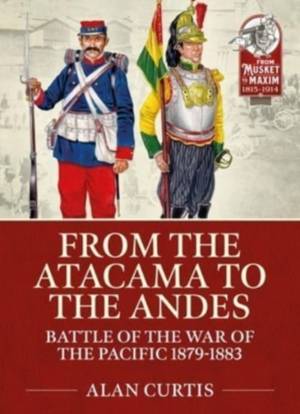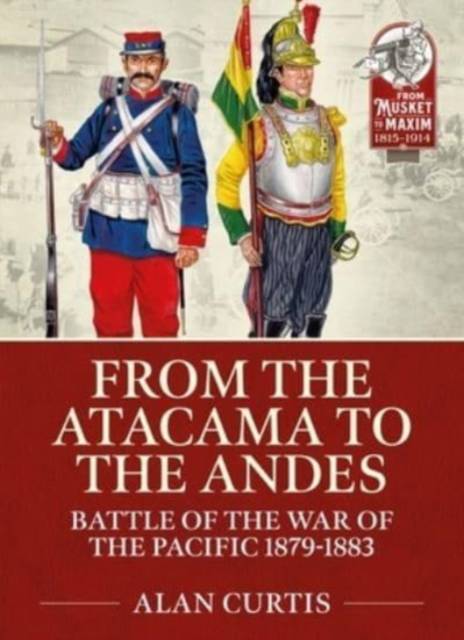
- Afhalen na 1 uur in een winkel met voorraad
- Gratis thuislevering in België vanaf € 30
- Ruim aanbod met 7 miljoen producten
- Afhalen na 1 uur in een winkel met voorraad
- Gratis thuislevering in België vanaf € 30
- Ruim aanbod met 7 miljoen producten
Zoeken
€ 41,95
+ 83 punten
Omschrijving
With the break up of the Spanish empire in South America, the continent split into nine independent states with often ill-defined boundaries. One of these was that between Bolivia and Chile, which were separated by the Atacama Desert, tone of the driest regions in the world. When it was realized that the area contained nitrates that the world needed for explosives and fertilizer the scene was set for the inevitable clash.
When war broke out in February 1879, both sides found themselves unprepared for war. Rapid armament followed as the Peruvians were dragged into the conflict in support of their Bolivian allies. Initially there was a tiresome naval war of blockade and guerre de course. Two naval actions decided the naval campaign in favor of the Chileans who then proceeded to use their naval power to attack the Allies' isolated armies and capture Lima two years after war had broken out. Fighting then developed into a cruel and ruthless guerrilla war in the Andes, sometimes even pitting Peruvian against Peruvian, before the Peruvians finally concede defeat.
The war was notable in the West for fights involving ironclads, particularly the Battle of Angamos, which saw the only time ironclads were pitted against each other between the Battle of Lissa and the Battle of the Yalu River. The war helped formulate Captain Mahan's thoughts in "The Influence of Sea Power upon History".
The land war was more or less ignored abroad, although it included some of the biggest battles ever fought on the continent, using all the latest technology, including breech loading rifles and cannons and machine guns. The armies on both sides initially lacked experience and training as well as modern equipment. The Bolivian Army started the war with 806 officers and only 1369 other ranks! In the end the Chileans won because of their more stable government, better financial situation and their control of the sea, due to their two superior ironclads.
From the Atacama to the Andes tells the brutal struggle between two sides to control the wealth of the Atacama and for retention of Bolivia's coast. The result was that Chile gained the mineral resources of the "New North" and Bolivia became the second landlocked country on the continent, paving the way for the even more catastrophic Chaco War 50 years later.
When war broke out in February 1879, both sides found themselves unprepared for war. Rapid armament followed as the Peruvians were dragged into the conflict in support of their Bolivian allies. Initially there was a tiresome naval war of blockade and guerre de course. Two naval actions decided the naval campaign in favor of the Chileans who then proceeded to use their naval power to attack the Allies' isolated armies and capture Lima two years after war had broken out. Fighting then developed into a cruel and ruthless guerrilla war in the Andes, sometimes even pitting Peruvian against Peruvian, before the Peruvians finally concede defeat.
The war was notable in the West for fights involving ironclads, particularly the Battle of Angamos, which saw the only time ironclads were pitted against each other between the Battle of Lissa and the Battle of the Yalu River. The war helped formulate Captain Mahan's thoughts in "The Influence of Sea Power upon History".
The land war was more or less ignored abroad, although it included some of the biggest battles ever fought on the continent, using all the latest technology, including breech loading rifles and cannons and machine guns. The armies on both sides initially lacked experience and training as well as modern equipment. The Bolivian Army started the war with 806 officers and only 1369 other ranks! In the end the Chileans won because of their more stable government, better financial situation and their control of the sea, due to their two superior ironclads.
From the Atacama to the Andes tells the brutal struggle between two sides to control the wealth of the Atacama and for retention of Bolivia's coast. The result was that Chile gained the mineral resources of the "New North" and Bolivia became the second landlocked country on the continent, paving the way for the even more catastrophic Chaco War 50 years later.
Specificaties
Betrokkenen
- Auteur(s):
- Uitgeverij:
Inhoud
- Aantal bladzijden:
- 236
- Taal:
- Engels
- Reeks:
Eigenschappen
- Productcode (EAN):
- 9781914059919
- Verschijningsdatum:
- 28/04/2022
- Uitvoering:
- Paperback
- Formaat:
- Trade paperback (VS)
- Afmetingen:
- 178 mm x 248 mm
- Gewicht:
- 576 g

Alleen bij Standaard Boekhandel
+ 83 punten op je klantenkaart van Standaard Boekhandel
Beoordelingen
We publiceren alleen reviews die voldoen aan de voorwaarden voor reviews. Bekijk onze voorwaarden voor reviews.







